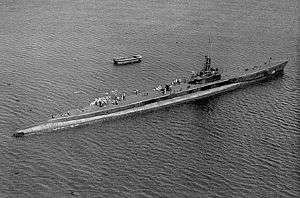USS Blackfin (SS-322)
 Blackfin in 1944 | |
| History | |
|---|---|
| Name: | USS Blackfin |
| Builder: | Electric Boat Company, Groton, Connecticut[1] |
| Laid down: | 10 June 1943[1] |
| Launched: | 12 March 1944[1] |
| Commissioned: | 4 July 1944[1] |
| Decommissioned: | 19 November 1948[1] |
| Recommissioned: | 15 May 1951[1] |
| Decommissioned: | 15 September 1972[1] |
| Struck: | 15 September 1972[1] |
| Fate: | Sunk as target off San Diego, California, 13 May 1973[2] |
| General characteristics (As completed) | |
| Class and type: | Balao-class diesel-electric submarine[2] |
| Displacement: | |
| Length: | 311 ft 9 in (95.02 m)[2] |
| Beam: | 27 ft 3 in (8.31 m)[2] |
| Draft: | 16 ft 10 in (5.13 m) maximum[2] |
| Propulsion: |
|
| Speed: | |
| Range: | 11,000 nautical miles (20,000 km) surfaced at 10 knots (19 km/h)[6] |
| Endurance: |
|
| Test depth: | 400 ft (120 m)[6] |
| Complement: | 10 officers, 70–71 enlisted[6] |
| Armament: |
|
| General characteristics (Guppy IA) | |
| Class and type: | none |
| Displacement: | |
| Length: | 307 ft 7 in (93.8 m)[8] |
| Beam: | 27 ft 4 in (8.3 m)[8] |
| Draft: | 17 ft (5.2 m)[8] |
| Propulsion: | |
| Speed: |
|
| Range: | 17,000 nm (28,000 km) surfaced at 11 knots (20 km/h)[8] |
| Endurance: | 36 hours at 3 knots (6 km/h) submerged[8] |
| Complement: |
|
| Armament: |
|
USS Blackfin (SS-322), a Balao-class submarine, was a ship of the United States Navy named for the blackfin, a food fish of the Great Lakes.
Blackfin (SS-322) was launched 12 March 1944 by Electric Boat Co., Groton, Conn., sponsored by Mrs. Phyllis Irwin Lockwood, wife of Rear Admiral Charles A. Lockwood; and commissioned 4 July 1944, Lieutenant Commander George Hays Laird, Jr., in command.
Blackfin arrived at Pearl Harbor 11 September 1944. During her war operations (30 September 1944 – 5 September 1945) she completed five war patrols. Her operating areas included the South China and the Yellow Seas. Blackfin sank the Japanese destroyer Shigure, 24 January 1945, in 06°00′N 103°48′E / 6.000°N 103.800°E., and a cargo ship for a total of 4325 tons.
The termination of hostilities occurred while Blackfin was on her fifth war patrol. After occupying a lifeguard station and destroying 61 floating mines, she retired to Guam, arriving in Apra Harbor 5 September 1945. After receiving voyage repairs and fuel she proceeded to San Diego where she joined Submarine Squadron 1.
Through July 1948 Blackfin continued on active duty in the Pacific. The majority of her operations were conducted near the Hawaiian and Mariana Islands. In June and July 1946 she participated in "Operation Iceberg" which took her across the Arctic Circle. She reported to Mare Island for inactivation in July 1948 and was placed out of commission in reserve there 19 November 1948.
In November 1950 Blackfin began conversion to a Guppy submarine and was recommissioned 15 May 1951. She operated with Submarine Force, Pacific Fleet, based at San Diego until 8 March 1954 and thereafter at Pearl Harbor. During this time she completed two tours in the Far East (December 1951–June 1952 and January–June 1955); conducted local and training operations; and made several simulated war patrols.
During her career, Blackfin was used in two movies: 1963's Move Over, Darling with Doris Day, James Garner, and Polly Bergen, and 1968's Ice Station Zebra with Rock Hudson, Ernest Borgnine, and Patrick McGoohan.
Blackfin was decommissioned and struck from the Naval Vessel Register on 15 September 1972. She was used as a target and sunk by torpedo in the "SubSinkEx Project Thurber" project off San Diego, California on 13 May 1973.
Blackfin received three battle stars for her World War II service.
References
- 1 2 3 4 5 6 7 8 Friedman, Norman (1995). U.S. Submarines Through 1945: An Illustrated Design History. Annapolis, Maryland: United States Naval Institute. pp. 285–304. ISBN 1-55750-263-3.
- 1 2 3 4 5 6 7 Bauer, K. Jack; Roberts, Stephen S. (1991). Register of Ships of the U.S. Navy, 1775-1990: Major Combatants. Westport, Connecticut: Greenwood Press. pp. 275–280. ISBN 0-313-26202-0.
- 1 2 3 4 5 Bauer, K. Jack; Roberts, Stephen S. (1991). Register of Ships of the U.S. Navy, 1775–1990: Major Combatants. Westport, Connecticut: Greenwood Press. pp. 275–280. ISBN 978-0-313-26202-9.
- ↑ U.S. Submarines Through 1945 p. 261
- 1 2 3 U.S. Submarines Through 1945 pp. 305–311
- 1 2 3 4 5 6 U.S. Submarines Through 1945 pp. 305-311
- 1 2 3 4 5 6 Friedman, Norman (1994). U.S. Submarines Since 1945: An Illustrated Design History. Annapolis, Maryland: United States Naval Institute. pp. 11–43. ISBN 1-55750-260-9.
- 1 2 3 4 5 6 U.S. Submarines Since 1945 pp. 242
- This article incorporates text from the public domain Dictionary of American Naval Fighting Ships. The entries can be found here and here.
External links
- Photo gallery of Blackfin at NavSource Naval History
- Kill record: USS Blackfin